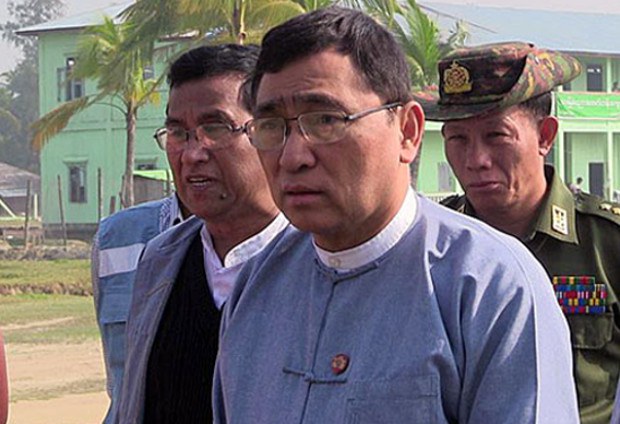‘We Needed More Time to Verify People’: Myanmar’s Win Myat Aye
2018.04.06
 Win Myat Aye (center), is Myanmar’s minister of social welfare, relief, and resettlement.
Win Myat Aye (center), is Myanmar’s minister of social welfare, relief, and resettlement.
Win Myat Aye, Myanmar’s minister for social welfare, relief and resettlement, will visit Bangladesh on April 11and 12 to meet with officials from Bangladesh’s foreign affairs and home affairs ministries to discuss delays with the repatriation of Rohingya Muslim refugees who live in massive displacement camps in southeastern Bangladesh.
Nearly 700,000 Rohingya poured out of northern Rakhine state during a brutal military crackdown that began in late August 2017 in response to deadly attacks by Muslim militants on police outposts. Though Myanmar and Bangladesh have signed agreements for the return of refugees who wish to return voluntarily to Rakhine, Myanmar officials have “verified” only about 500 from an initial list of more than 8,000 supplied by Bangladeshi officials.
Myanmar says some refugees have not completed their repatriation application forms correctly. Win Myat Aye, who is in charge of the repatriation program, discussed his upcoming visit to Bangladesh, which may also include stops at refugee camps as he has requested, with reporter Thinn Thiri of the Radio Free Asia (RFA) Myanmar Service, a sister entity of BenarNews.
What follows is an edited version of their conversation:
Radio Free Asia: What is the intention of Myanmar’s top-level delegation’s first trip to Bangladesh?
Win Myat Aye: The intention is to discuss with Bangladeshi authorities the delay in refugee repatriation.
RFA: Will you meet members of the Bangladeshi government or United Nations officials?
WMA: As far as I know, the Bangladeshi government has arranged for us to meet with the ministers of foreign affairs and home affairs. If they can arrange it, we will go to the refugee camps as well.
RFA: What is the main reason for the delay of the refugee repatriations?
WMA: If the process goes according to the agreement between Bangladesh and Myanmar and if the refugees filled out the forms according to the agreement, it shouldn’t be delayed. But it didn’t turn out the way we expected it to. If the refugees had filled out the forms according to the agreement, the process would be faster than it is right now. We will talk about it when I am in Bangladesh.
RFA: Will the Myanmar government work with U.N. agencies such as United Nations High Commissioner for Refugees (UNHCR) and United Nations Development Program (UNDP) on the refugee issue? What agreement does the government have with these agencies?
WMA: In the agreement [with Bangladesh] we already talked about working together with the U.N. agencies on this issue when it is necessary. We have already talked about it with the UNHCR and UNDP as well.
RFA: In February, Bangladesh sent Myanmar a list of 8,032 refugees who want to return home, and Myanmar authorities have approved 900 people, according to Myint Thu, permanent secretary of Myanmar’s Ministry of Foreign Affairs. The number includes about 500 Muslims and about 400 Hindu refugees who also fled to Bangladesh from northern Rakhine and had been approved for return prior to the issuance of the list. What are you doing about the rest of the refugees in Bangladesh?
WMA: As I told you before, the forms they filled out were not according to the instructions in the agreement. That’s why we needed more time to verify people. We sent a list of those whom we could verify to Bangladesh, but we haven’t heard anything back yet.
RFA: What results do you expect from your trip to Bangladesh, especially on the issue of refugee repatriation?
WMA: Bangladesh and Myanmar are neighbors, so the refugee issue is both countries’ problem. People who lived in our country fled to Bangladesh. We have a responsibility to take them back, and both countries have agreed to the refugee repatriation. Bangladesh and Myanmar have to work together on this issue by maintaining a good relationship. We will have a good outcome because I am going to Bangladesh to discuss with Bangladeshi authorities about how we can have smooth cooperation.







